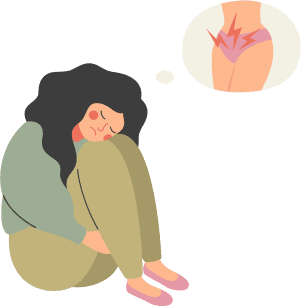Support Centre
Soreness and pain during intercourse
Menopause symptoms and treatments.
Soreness and pain during intercourse
Dyspareunia, or discomfort and pain during sex, can happen after menopause for a number of reasons, including hormonal changes, vaginal dryness, and changes in the pelvic tissues.

Book a consultation.
If you have any questions or concerns about your health, please book a consultation.
Don’t worry alone, we’re here to help.
Contributing factors
Changes in pelvic tissues: The vaginal walls and nearby structures, as well as the health and elasticity of the pelvic tissues, are all influenced by oestrogen. These tissues may become thinner, less flexible, and more sensitive as oestrogen levels fall, increasing their susceptibility to pain or discomfort during sexual activity.
Changes in hormones: Dryness and atrophy of the vaginal tissues (vaginal atrophy) might result from the reduction in oestrogen levels that occurs during menopause. These modifications may lead to a loss of lubrication and flexibility, which increases the risk of irritation and pain in the vaginal walls during sexual activity.
Reduced blood flow: Hormonal changes may also have an impact on the pelvic region’s blood flow, which may lessen genital sensitivity and arousal. During sexual engagement, insufficient blood flow may be a factor in discomfort or pain.
Psychological factors: Sexual experiences might be affected by the profound physical and mental changes that occur with menopause. Reduced arousal and greater discomfort during intercourse can be caused by elements like anxiety, stress, interpersonal dynamics, and pain-related worries.
Strategies that may help manage soreness and pain during intercourse
Lubricants and moisturisers: Applying water-based lubricants or vaginal moisturisers helps reduce dryness of the vagina and enhance lubrication during sexual activity. These products can aid in easing discomfort and friction.
Vaginal oestrogen therapy: If a woman’s vagina is significantly atrophying or drying out, vaginal oestrogen therapy may be advised. Oestrogen lotions, tablets, or rings can help rehydrate the vagina, increase vaginal suppleness, and reduce pain while having sex.
Slow and delicate approach: Allowing enough time for foreplay and practising slow, gentle sex can help to build lubrication and ease discomfort. It’s crucial to be upfront with your partner about your wants and worries if you want to make the relationship comfortable and enjoyable.
Exercises for the pelvic floor: Regular pelvic floor exercises can improve pelvic muscle strength and enhance bladder control. The muscles that control continence are contracted and relaxed during these activities. Using an App such as Squeezy or a device such as an Elvie can be helpful. A pelvic floor Physiotherapist can also support you with this.
Counselling or therapy: Seeking counselling or therapy may be helpful if discomfort during sexual activity is impacting your sexual and mental well-being. Any psychological difficulties causing discomfort, such as worry or relationship problems, can be addressed with the assistance of a therapist.
- Anger and irritability
- Anxiety and panic
- Bleeding from sex
- Brain fog and memory loss
- Depression
- Fatigue and lack of motivation
- Headaches and migraine
- Hot flushes, night sweats and palpitations
- Joint pain and muscle aches
- Low mood and crying
- Low self esteem and lack of confidence
- Low sex drive and painful sex
- Numbness and tingling
- Palpitations
- Period changes
- Skin changes
- Soreness and pain during intercourse
- Trouble sleeping
- Urinary habits and incontinence
- Vaginal dryness and sore vulva
- Women’s Health